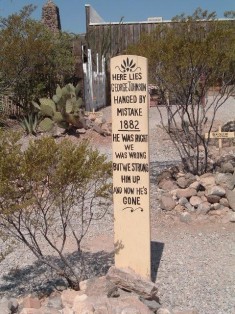 Usually, a bad man was buried unceremoniously in a local “boot hill,” so called because most of those who were buried therein died with their boots on, and were even buried with them on. However, some had funerals; and tombstones with epitaphs marked their graves for some time, usually until souvenir hunters demolished them. On Sam Bass’ tombstone was engraved, “A brave man reposes in death here. Why was he not true?” On Seaborne Barnes’ gravestone was written, “He was right bower (meaning he was an anchor) to Sam Bass.” Besides his name and dates, Cole Younger’s tombstone had the words, “Rest in Peace, Our Dear Beloved.” Perhaps Jesse James’s complete epitaph should be given: “In Loving Remembrance of My Beloved Son, Jesse W. James, Died April 3, 1882, Aged 36 Years, 6 Months, 28 Days Murdered by a Traitor and Coward Whose Name is Not Worthy to Appear Here.” (I think I’ll have something like that inscribed on my brother’s tombstone.) The coward referred to was Bob Ford who, as you recall, shot Jesse in the back while he was hanging a picture on the wall, very unusually unarmed. Other than biographical information, Langford Peel’s tombstone bore the inscriptions: “In Life, Beloved by his Friends, and Respected by his Enemies. Vengeance is Mine, Saith the Lord, I Know That My Redeemer Liveth. Erected by a Friend.” Most unusual of the epitaphs of bad men was that of Lame Johnny, a man who never knew when to keep his mouth shut, hanged by impromptu vigilantes and award the epitaph: “Lame Johnny, Stranger, pass gently o’er this sod. If he opens his mouth, you’re gone, by God.”
Usually, a bad man was buried unceremoniously in a local “boot hill,” so called because most of those who were buried therein died with their boots on, and were even buried with them on. However, some had funerals; and tombstones with epitaphs marked their graves for some time, usually until souvenir hunters demolished them. On Sam Bass’ tombstone was engraved, “A brave man reposes in death here. Why was he not true?” On Seaborne Barnes’ gravestone was written, “He was right bower (meaning he was an anchor) to Sam Bass.” Besides his name and dates, Cole Younger’s tombstone had the words, “Rest in Peace, Our Dear Beloved.” Perhaps Jesse James’s complete epitaph should be given: “In Loving Remembrance of My Beloved Son, Jesse W. James, Died April 3, 1882, Aged 36 Years, 6 Months, 28 Days Murdered by a Traitor and Coward Whose Name is Not Worthy to Appear Here.” (I think I’ll have something like that inscribed on my brother’s tombstone.) The coward referred to was Bob Ford who, as you recall, shot Jesse in the back while he was hanging a picture on the wall, very unusually unarmed. Other than biographical information, Langford Peel’s tombstone bore the inscriptions: “In Life, Beloved by his Friends, and Respected by his Enemies. Vengeance is Mine, Saith the Lord, I Know That My Redeemer Liveth. Erected by a Friend.” Most unusual of the epitaphs of bad men was that of Lame Johnny, a man who never knew when to keep his mouth shut, hanged by impromptu vigilantes and award the epitaph: “Lame Johnny, Stranger, pass gently o’er this sod. If he opens his mouth, you’re gone, by God.”
Follow Me
© 2025 Chris Enss | Privacy Policy | Design by Winter Street Design Group | Login

